人教版新目标初中英语
- 格式:pptx
- 大小:963.45 KB
- 文档页数:16
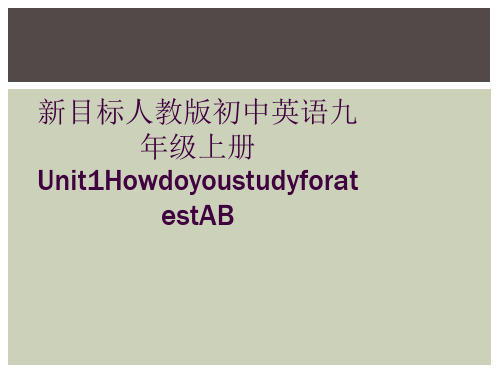
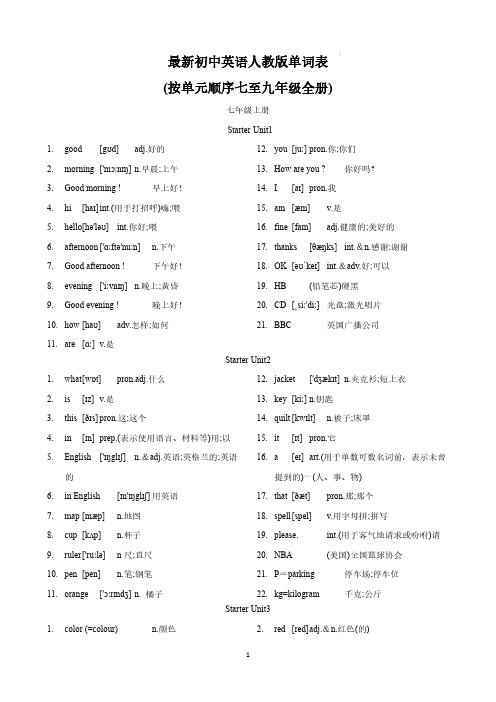
最新初中英语人教版单词表(按单元顺序七至九年级全册)七年级上册Starter Unit11.good[gʊd]adj.好的2.morning['mɔːnɪŋ]n.早晨;上午3.Good morning!早上好!4.hi[haɪ]int.(用于打招呼)嗨;喂5.hello[hə'ləʊ]int.你好;喂6.afternoon['ɑːftə'nuːn]n.下午7.Good afternoon!下午好!8.evening['iːvnɪŋ]n.晚上;黄昏9.Good evening!晚上好!10.how[haʊ]adv.怎样;如何11.are[ɑː]v.是12.you[juː]pron.你;你们13.How are you?你好吗?14.I[aɪ]pron.我15.am[æm]v.是16.fine[faɪn]adj.健康的;美好的17.thanks[θæŋks]int.&n.感谢;谢谢18.OK[əʊˈkeɪ]int.&adv.好;可以19.HB(铅笔芯)硬黑20.CD[ˌsiː'diː]光盘;激光唱片21.BBC英国广播公司Starter Unit21.what[wɒt]pron.adj.什么2.is[ɪz]v.是3.this[ðɪs]pron.这;这个4.in[ɪn]prep.(表示使用语言、材料等)用;以5.English['ɪŋglɪʃ]n.&adj.英语;英格兰的;英语的6.in English[ɪn'ɪŋglɪʃ]用英语7.map[mæp]n.地图8.cup[kʌp]n.杯子9.ruler['ruːlə]n尺;直尺10.pen[pen]n.笔;钢笔11.orange['ɔːrɪndʒ]n.橘子12.jacket['dʒækɪt]n.夹克衫;短上衣13.key[kiː]n.钥匙14.quilt[kwɪlt]n.被子;床罩15.it[ɪt]pron.它16.a[eɪ]art.(用于单数可数名词前,表示未曾提到的)一(人、事、物)17.that[ðæt]pron.那;那个18.spell[spel]v.用字母拼;拼写19.please.int.(用于客气地请求或吩咐)请20.NBA(美国)全国篮球协会21.P=parking停车场;停车位22.kg=kilogram千克;公斤Starter Unit31.color(=colour)n.颜色2.red[red]adj.&n.红色(的)3.yellow['jeləʊ]adj.&n.黄色(的)4.green[griːn]adj.&n.绿色(的)5.blue[bluː]adj.&n.蓝色(的)6.black[blæk]adj.&n.黑色(的)7.white[hwaɪt]adj.&n.白色(的)8.purple['pɜːpl]adj.&n.紫色(的)9.brown[braʊn]adj.&n.棕色(的);褐色(的)10.the[ðə]art.指已提到或易领会到的人或事物11.now[naʊ]adv.现在;目前12.see[siː]v.理解;明白13.can[kæn]modal v.能;会14.say[seɪ]v.说;讲15.my[maɪ]pron.我的16.S(尤指服装的尺码)小号的17.M(尤指服装的尺码)中号的18.L(尤指服装的尺码)大号的19.UFO不明飞行物TV中国中央电视台Unit1[neɪm]n.名字;名称2.nice[naɪs]adj.令人愉快的;宜人的3.to[tuː]常用于原形动词之前,表示该动词为不定式4.meet[miːt]v.遇见;相逢5.too[tuː]adv.也;又;太6.your[jʊə]pron.你的;你们的7.Ms.[mɪz](用于女子的姓氏或姓名前,不指明婚否)女士8.his[hɪz]pron.他的9.and[ænd]conj.和;又;而10.her[hɜː]pron.她的11.yes[jes]int.是的;可以12.she[ʃiː]pron.她13.he[hiː]pron.他14.no[nəʊ]int.不;没有;不是15.not[nɒt]adv.不;没有16.zero['zɪərəʊ]num.零17.one[wʌn]num.一18.two[tuː]num.二19.three[θriː]num.三20.four[fɔː]num.四21.five[faɪv]num.五22.six[sɪks]num.六23.seven['sevn]num.七24.eight[eɪt]num.八25.nine[naɪn]num九26.telephone[fəʊn]n.电话;电话机27.number['nʌmbə]n.号码;数字28.phone[fəʊn]n.电话;电话机29.telephone number电话号码30.phone number电话号码31.first[fɜːst]adj.第一32.first name名字st[lɑːst]adj.最后的;末尾的st name姓35.friend[frend]n.朋友36.China['tʃaɪnə]中国37.middle['mɪdl]adj.&n.中间的;中间38.school[skuːl]n.学校39.middle school中学;初中Unit21.sister['sɪstə]n.姐;妹2.mother['mʌðə]adj.母亲;妈妈3.father['fɑːðə]n.父亲;爸爸4.parent['peərənt]n.父(母)亲5.brother['brʌðə]n.兄;弟6.grandmother['grændˌmʌðə]n.(外)祖母;奶奶;外婆;姥姥7.grandfather['grændˌfɑːðə]n.(外)祖父;爷爷;外公;姥爷8.grandparent[/ˈɡrændˌpeərənt]n.祖父(母);外祖父(母)9.family['fæmɪli]n.家;家庭10.those[ðəʊz]pron.那些11.who[huː]pron.谁;什么人12.oh[əʊ]int.哦;啊13.these[ðiːz]pron.这些14.they[ðeɪ]pron.,他(她、它)们15.well[wel]int.嗯;好吧16.have[hæv]v.经受;经历17.day[deɪ]n.一天;一日;白天18.Have a good day!(表示祝愿)过得愉快!19.bye(=goodbye)int.再见20.son[sʌn]n.儿子21.cousin['kʌzn]n.堂(表)兄(弟、姐、妹)22.grandpa['grændpɑː]n.(外)祖父;爷爷;外公;姥爷23.mom(=mum)n.妈妈24.aunt[ɑːnt]n.姑母;姨母;伯母;婶母;舅母25.grandma['grændmɑː]n.(外)祖母;奶奶;外婆;姥姥26.dad[dæd]n.爸爸27.uncle['ʌŋkl]n.舅父;叔父;伯父;姑父;姨父28.daughter['dɔːtə]n.女儿29.here[hɪə]adv.这就是;在这里30.photo['fəʊtəʊ]n.照片31.of[ɒv]prep.属于(某人或某物);关于(某人或某物)32.next['nekst]adj.&n.下一个(的);接下来(的)33.picture['pɪktʃə]n.照片;图画34.girl[gɜːl]n.女孩35.dog[dɒg]n.狗Unit31.pencil['pensl]n.铅笔2.book[bʊk]n.书3.eraser[ɪ'reɪsə]n.橡皮4.box[bɒks]n.箱;盒5.pencil box铅笔盒;文具盒6.schoolbag['skuːlˌbæg]n.书包7.dictionary['dɪkʃəneri]n.词典;字典8.his[hɪz]他的9.mine[maɪn]pron.我的10.hers[hɜːz]pron.她的11.excuse[ɪks'kjuːz]v.原谅;宽恕12.me[miː]pron.(I的宾格)我13.excuse me.劳驾;请原谅14.thank[θæŋk]v.感谢;谢谢15.teacher['tiːtʃə]n.老师;教师16.about[ə'baʊt]prep.关于17.What about…?(询问消息或提出建议)……怎么样?……好吗?18.yours[jʊəz]pron.你的;你们的19.for[fɔː]prep.为了;给;对20.thank you for…为……而感谢21.help[help]v.&n.帮助;援助22.welcome['welkəm]adj.受欢迎的23.You're welcome.别客气。

人教版新目标(go for it!)《英语》九年级
摘要:
1.介绍人教版新目标《英语》九年级教材
2.教材的主要特点和优势
3.九年级英语学习的重要性
4.如何有效利用该教材进行学习
正文:
人教版新目标《英语》九年级教材是一本针对我国初中生英语学习而编写的教材。
该教材具有许多优点和特点,旨在帮助学生更好地掌握英语知识和技能。
首先,该教材注重学生的语言实践能力。
通过丰富的语言活动,如对话、阅读、听力等,让学生在实践中提高语言运用能力。
此外,教材内容贴近学生的生活实际,使学生在学习过程中感到亲切自然,增强了学习的兴趣和动力。
其次,人教版新目标《英语》九年级教材遵循语言学习的规律,注重知识的系统性和渐进性。
教材内容由浅入深,从基础的语法、词汇到听说读写技能的培养,逐步提高学生的英语综合素质。
九年级是初中阶段的最后一年,也是英语学习的关键时期。
在这个阶段,学生的英语水平将面临一个较大的跨越。
因此,使用好人教版新目标《英语》九年级教材,对于提高学生的英语成绩和综合素质具有重要意义。
如何有效地利用该教材进行学习呢?首先,学生应养成良好的学习习惯,如每天定时复习、预习,做好课堂笔记。
其次,要注重听力和阅读训练,通过多听、多读来提高自己的语言实践能力。
此外,学生还应主动参与课堂活动,
与同学进行对话练习,提高口语表达能力。
总之,人教版新目标《英语》九年级教材是一本优秀的英语学习教材。

01Unit4 单词humorous[ˈhjuːmərəs]有幽默感的;滑稽有趣的silent[ˈsaɪlənt]不说话的;沉默的helpful['helpfəl]有用的;有帮助的from time to time[frɒm//taɪm//tuː//taɪm]时常;有时score[skɔː]得分;打分background[ˈbækɡraʊnd]背景interview[ˈɪntəvjuː]采访;面试n.Asian[ˈeɪʃ(ə)nˌˈeɪʒ(ə)n]亚洲的;亚洲人的,亚洲人deal with对付;应付dare[deə]敢于;胆敢private[ˈpraɪvɪt]私人的;私密的guard[ɡɑːd]警卫;看守v.守卫;保卫require[rɪˈkwaɪə]需要;要求European[jʊərəˈpiːən]欧洲的;欧洲人的British['brɪtɪʃ]英国的;英国人的speech[spiːtʃ]讲话;发言ant[ænt]蚂蚁insect[ˈɪnsekt]昆虫influence[ˈɪnflʊəns]影响seldom[ˈseldəm]不常;很少proud[praʊd]自豪的;骄傲的be proud of为⋯⋯骄傲;感到自豪absent[ˈæbsənt]缺席;不在fail[feɪl]失败;未能(做到)examination[ɪgˌzæmɪ'neɪʃən]考试;审查boarding school寄宿学校in person亲身;亲自exactly[ɪg'zæktli]确切地;精确地pride[praɪd]自豪;骄傲take pride in为⋯⋯感到自豪grandson[ˈɡrændsʌn]孙子;外孙general[ˈdʒenər(ə)l]普遍的;常规的;总的将军introduction[ɪntrəˈdʌkʃ(ə)n]介绍Paula 葆拉(女名)Alfred 艾尔弗雷德(男名)Billy 比利(男名)Candy 坎迪(女名)Jerry 杰里(男名);杰丽(女名)Emily 埃米莉(女名)02Unit4 知识梳理Unit4 I used to be afraid of the dark.【重点短语】ed to do 过去常常做2.deal with 对付应付3.be proud of 为……骄傲,感到自豪4.take pride in 为……感到自豪5.from time to time 时常,有时6.in public 公开地7.in person 亲身,亲自8.take up sth 开始做,接受,占用9.not……anymore 不再10.worry about 为……担忧11.hang out 闲逛12.think about 考虑13.be alone 独处14.on the soccer team 在足球队15.no longer 不再16.make a decision 做决定17.to one’s surprise 令某人吃惊的是18.even though 尽管19.pay attention to 对……注意,留心20.in the last few years 在过去的几年里21.be afraid of 害怕22.turn red 变红23.tons of attention 很多关注24.be careful 当心25.give up 放弃26.a very small number of …极少数的……27.give a speech 作演讲28.all the time 一直总是29.be interested in 对……感兴趣30.change one’s life 改变某人的生活31.take care of 照顾32.one of…, ……之一【重点句型】1. I used to be afraid of the dark.我过去常常前害怕黑暗.2.I go to sleep with my bedroom light on.我开着卧室的灯睡觉.3. I used to spend a lot of time playing games with my friends.以前我常常花很多时间和我的朋友们玩游戏.4. I hardly ever have time for concerts.我几乎没有时间去听音乐会.5. My life has changed a lot in the last few years.我的生活在过去几年里改变了很多.6. It will make you stressed out.那会使你紧张的.7. It seems that Yu Mei has changed a lot.玉梅似乎变化很大.03词汇精讲1. silentsilent是形容词,意为“沉默的;无言的”,其名词形式为silence。
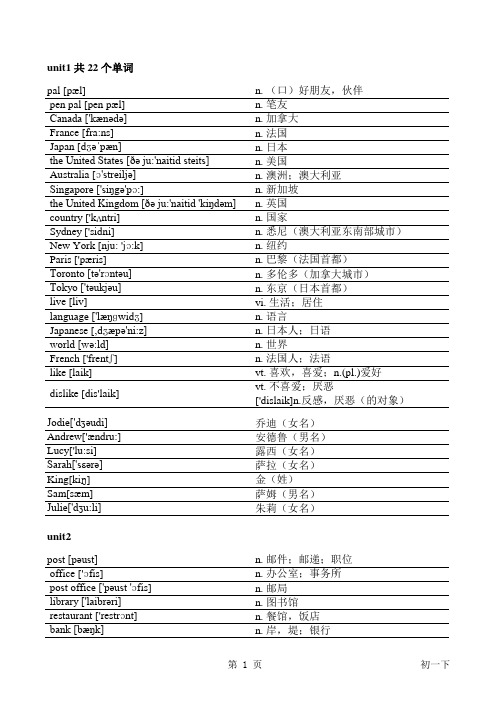
unit1 共 22 个单词pal [pæl]n. (口)好朋友,伙伴pen pal [pen pæl]n. 笔友Canada ['kænədə]n. 加拿大France [fra:ns]n. 法国Japan [dʒəˈpæn]n. 日本the United States [ðə ju:'naitid steits]n. 美国Australia [ɔ'streiljə]n. 澳洲;澳大利亚Singapore ['siŋgə'pɔ:]n. 新加坡the United Kingdom [ðə ju:'naitid 'kiŋdəm]n. 英国country ['kʌntri]n. 国家Sydney ['sidni]n. 悉尼(澳大利亚东南部城市) New York [nju: 'jɔ:k]n. 纽约Paris ['pæris]n. 巴黎(法国首都)Toronto [tə'rɔntəu]n. 多伦多(加拿大城市)Tokyo ['təukjəu]n. 东京(日本首都)live [liv]vi. 生活;居住language ['læŋɡwidʒ]n. 语言Japanese [,dʒæpə'ni:z]n. 日本人;日语world [wə:ld]n. 世界French ['frentʃ]n. 法国人;法语like [laik]vt. 喜欢,喜爱;n.(pl.)爱好dislike [dis'laik]vt. 不喜爱;厌恶['dislaik]n.反感,厌恶(的对象)Jodie['dʒəudi]乔迪(女名)Andrew['ændru:]安德鲁(男名)Lucy['lu:si]露西(女名)Sarah['sεərə]萨拉(女名)King[kiŋ]金(姓)Sam[sæm]萨姆(男名)Julie['dʒu:li]朱莉(女名)unit2post [pəust]n. 邮件;邮递;职位 office ['ɔfis]n. 办公室;事务所 post office ['pəust 'ɔfis]n. 邮局library ['laibrəri]n. 图书馆restaurant ['restrɔnt]n. 餐馆,饭店bank [bæŋk]n. 岸,堤;银行supermarket ['sju:pə,mɑ:kit]n. 超级市场St [stri:t]abbr. 街,街道(= street)street [stri:t]n. 街,街道pay [pei]v. 支付;给…报酬pay phone [pei fəun]n. 投币式公用电话park [pɑ:k]n. 公园;停车场Ave. ['ævənju:]abbr(= avenue). 大街;林荫道 avenue [‘ævənju:]n. 大街;林荫道center ['sentə]n. 中心,中央bridge [bridʒ]n. 桥,桥梁mail [meil]n. 邮件there [ðeə]adv. 在那里;往那里near [niə]prep. 在…附近across [əkrɔ:s]prep. 横过,穿过;在对面across from [əkrɔ:s frɔm]在…对面next [nekst]prep.紧靠……的旁边;贴近;最接近;adj.下一个的next to [nekst tu:]紧靠……的旁边 ;贴近;between [bi'twi:n]prep. 介于(两者)之间;在(两者)之间front [frʌnt]n. 前面,前边in front of [in frʌnt əv]prep. 在…前面behind [bi'haind]prep. 在…之后neighborhood ['neibəhud]n. 街区;附近;邻近地区just [dʒʌst]adv. 直接地;就;只;仅仅straight [streit]adv. 径直地;直接地turn [tə:n]v. 转弯;转变方向;转动;转变;轮流 left [left]adv.δ n. 向左,左边down [daun]adv.δ prep. 向下;下去;沿着right [rait]adv.δ n.. 向右;右边;正确;权利on the right [ɔn ðə rait]在右边open ['əupən]adj.开着的;营业中的vt. 打开;开办market ['mɑ:kit]n. 市场,集市clean [kli:n]adj.清洁的;干净的vt. 弄干净,擦干净quiet ['kwaiət]adj. 安静的,宁静的 dirty ['də:ti]adj. 脏的,肮脏的house [haus]n. 房子,住宅welcome ['welkəm]int. 欢迎garden ['gɑ:dn]n. 花园;果园;菜园 district ['distrikt]n. 区;地区;区域enjoy [in'dʒɔi]vt. 欣赏,享受…之乐趣;喜walk [wɔ:k]n.散步;步行v. 走,步行take a walk [teik ə wɔ:k]散步;步行through [θru:]prep. 穿(通)过beginning [bi'ɡiniŋ]n. 开始,开端tour [tuə]n. 旅行;游历visit ['vizit]vt. 访问,拜访;参观 place [pleis]n. 地方;地点fun [fʌn]n.愉快;开心;乐趣;玩笑;有趣的人或事have fun [hæv fʌn]玩得开心if [if]conj. (表示条件)如果;是否hungry ['hʌŋɡri]adj. 饥饿的arrive [ə'raiv]vi. 到达;抵达way [wei]n. 路,路线;路途;方式;方向take [teik]vt. 拿,取;乘坐(车、船);花费 taxi ['tæksi]n. 出租车airport ['εəpɔ:t]n. 飞机场pass [pɑ:s]vt. 经过;通过;传递hope [həup]v. 希望;盼望;期待yours [jɔ:z]pron. 你的;你们的Nancy['nænsi]南希(女名)unit3 共 32 个单词koala [kəu'ɑ:lə]n.(澳洲)树袋熊,考拉tiger ['taiɡə]n. 老虎elephant ['elifənt]n. 象dolphin ['dɔlfin]n. 海豚panda ['pændə]n. 熊猫lion ['laiən]n. 狮子penguin ['peŋɡwin]n. 企鹅giraffe [dʒi'rɑ:f]n. 长颈鹿zoo [zu:]n. 动物园cute [kju:t]adj. 可爱的;聪明的;漂亮的map [mæp]n. 地图smart [smɑ:t]adj. 聪明的;漂亮的animal ['æniməl]n. 动物box [bɔks]n. 盒子,箱子kind of [kaind ɔv]种(类);有点儿,有几分south [sauθ]n. 南,南方adj.在南方的;南部的;向南的Africa ['æfrikə]n. 非洲bingo ['biŋɡəu]n. 宾戈(一种游戏)ugly ['ʌɡli]adj. 丑陋的,难看的clever ['klevə]adj. 聪明的,机灵的friendly ['frendli]adj. 友好的beautiful ['bju:tifəl]adj. 美好的,美丽的shy [ʃai]adj. 害羞的;羞怯的other ['ʌðə]adj. 其他的;另外的grass [ɡrɑ:s]n. 草;草地sleep [sli:p]vi. 睡;睡觉during ['djuəriŋ]prep. 在…期间;在…过程at night [æt nait ]在晚上,在夜里leaf [li:f]n. 叶子,树叶lazy ['leizi]adj. 懒惰的;懒散的meat [mi:t]n.(食用)肉,肉类relax [ri'læks]v. (使)放松;休息Julia['dʒu:ljə]朱莉娅(女名)Henry['henri]亨利(男名)Molly['mɔli]莫莉(女名)(文中指动物)Larry['læri]拉里(男名)(文中指动物)unit4 共 45 个单词shop [ʃɔp]n. 商店;店铺;车间assistant [əˈsistənt]n. 助手,助理shop assistant [ʃɔp əˈsistənt]店员;售货员doctor [dɔktə]n. 医生;博士reporter [ri'pɔ:tə]n. 记者;通讯员policeman [pə'li:smən]n. 男警察waiter ['weitə]n. 服务员,侍者bank clerk [bæŋk klɑ:k]银行职员hospital ['hɔspitəl]n. 医院now [nau]adv. 现在,如今;此时star [stɑ:]v.担任主角;主演n. 星,恒星policewoman [pə'li:s,wumən]n. 女警察nurse [nə:s]n. 护士;保姆money ['mʌni]n. 钱,金钱;货币 give [giv]vt. 给;付出;给予get [get]v. 获得;得到;购买;拿来;到达 wear [weə]v. 穿,戴uniform ['ju:nifɔ:m]n. 制服sometimes ['sʌmtaimz]adv. 不时;有时in [in]prep. 在…期间;在…里(内)dangerous ['deindʒərəs]adj. 危险的thief[θi:f]n.小偷late [leit]adv.晚;晚于通常时间adj. 晚的,迟的out [aut]adv. 在外;向外;出去talk [tɔ:k]v. 交谈;谈论station ['steiʃən]n. 车站;局;电台TV station ['ti:'vi: steiʃən]电视台police [pə'li:s]n. 警察police station [pə'li:s steiʃən]警察局newspaper ['nju:s,peipə]n. 报纸hard [hɑ:d]adj. 辛苦的;努力的;硬的;困难的as [æz]prep.作为conj. 因为;随着at [æt]prep. 在(几点钟);按照;根据 summer ['sʌmə]n. 夏天,夏季story ['stɔ:ri]n. 故事;事迹;小说magazine ['mæɡə'zi:n]n. 杂志;期刊young [jʌŋ]adj. 年轻的;幼小的play [plei]v. 玩;打(球);播放n.戏剧;剧本news [nju:z]n. 新闻;消息children ['tʃildrən]n. 孩子,儿童(child的复数) international [,intə'næʃənəl]adj. 国际的teach [ti:tʃ]v. 教,讲授skill [skil]n. 技能,技巧sir [sə:]n. 先生;阁下madam ['mædəm]n. 夫人,女士Susan['su:zn]苏姗(女名)Betty[beti]贝蒂(女名)Karen['kærən]卡伦(女名)Frank[fræŋk]弗兰克(男名)unit5 共 16 个单词clean [kli:n]vt. 打扫;清除;擦干净read [ri:d]v. 读;阅读on [ɔn]prep.通过;以…的方式;在…上(时);关于apartment [ə'pɑ:tmənt]n. 公寓;住宅 TV show ['ti:'vi: ʃəu]电视节目sure [ʃuə]adv. 当然,的确adj.确信的,确实的wait [weit]v. 等待,等候 wait for [weit fɔ:]等候,等待 toy [tɔi]n. 玩具west [west]n. 西;西方adj.西方的;在西方的;向西方的activity [æk'tivəti]n. 活动shop [ʃɔp]v.买东西;购物mall [mɔ:l]n. 购物商场;商业街 pool [pu:l]n. 水塘,水池camera ['kæmərə]n. 照相机;摄像机 bird [bə:d]n. 鸟Steve[sti:v]史蒂夫(男名)unit6 共 34 个单词rain [rein]v.下雨n. 雨,雨水windy ['windi]adj. 有风的;多风的cloudy ['klaudi]adj. 多云的,阴天的sunny ['sʌni]adj. 晴朗的;阳光充足的snow [snəu]v.下雪n. 雪weather ['weðə]n. 天气Moscow ['mɔskəu]莫斯科(俄罗斯首都)Boston ['bɔstən]波士顿(美国马萨诸塞州首府)cook [kuk]v.烹调;煮n. 厨师study ['stʌdi]v. 学习;研究how's [haus]怎么样(= how is)bad [bæd]adj. 坏的;劣质的;严重的 terrible ['terəbl]adj. 很糟的;极坏的;可怕的pretty ['priti]adv.相当;很;颇adj. 漂亮的,俊俏的hot [hɔt]adj.炎热的;热的;热情的cold [kəuld]adj. 寒冷的;冷的cool [ku:l]adj. 凉爽的;(口语)酷warm [wɔ:m]adj. 温暖的;暖和的;热情的humid ['hju:mid]adj. 潮湿的;湿润的vacation [və'keiʃən]n. 假期;休假on vacation [ɔn və'keiʃən]在假期中;在度假take a photo [teik ə fəutəu]拍照lie [lai]v. (现在分词lying)说谎;躺;位于 beach [bi:tʃ]n. 海滩;海滨look at [luk æt]看,朝…看group [ɡru:p]n. 组,群;团体surprised [sə'praizd]adj. 感到惊讶的heat [hi:t]n. 热;热度relaxed [ri'lækst]adj. 放松的;自在的;得到休息的winter ['wintə]n. 冬天,冬季scarf [skɑ:f]n.(pl.scarfs或scarves)围巾;披巾 everyone ['evriwʌn]pron. 每个人,人人have a good time [hæv ə ɡud taim]玩得高兴,过得快乐man [mæn]n. 男人;人,人类review of units 1-6describe[di'skraib]v.描述;形容look for寻找;寻求talk about谈论;讨论;议论direction n.方向unit['ju:nit]n.单元most[məust]adv.(many和much的最高级)最following['fɔləuiŋ]adj.下列的;下述的in order to为了improve[im'pru:v]v.改进;改善unit7 共 31 个单词hair [heə]n. 头发;毛发curly ['kə:li]adj. 卷曲的;卷毛的straight [streit]adj. 直的;笔直的tall [tɔ:l]adj. 高的medium ['mi:diəm]adj. 中间的,中等的height [hait]n. 高,高度thin [θin]adj. 瘦的;薄的;稀的heavy ['hevi]adj. 重的;繁重的;沉重的build [bild]n.体格;体形v. 建筑,建造like [laik]prep.像;如同v. 喜欢,喜爱always ['ɔ:lweiz]adv. 总是;一直;始终captain ['kæptin]n. 船长;队长;首领team [ti:m]n. 队;组popular ['pɔpjulə]adj. 通俗的;流行的,受欢迎的 blonde [blɔnd]adj. 金黄色的good-looking ['ɡud'lukiŋ]adj. 漂亮的bit [bit]n. 一点儿,少许a little bit [ə litl bit]一点儿;少许joke [dʒəuk]n. 笑话;玩笑never ['nevə]adv. 从未;决不stop [stɔp]v. 停止;终止brown [braun]adj.棕色的;褐色的n. 褐色,棕色person ['pə:sən]n. 人;人物 beard [biəd]n. 胡须glasses ['glɑ:siz]n.(pl.)眼镜look [luk]n.外表;外貌v. 看,观看remember [ri'membə]v. 牢记;记住;记得pop [pɔp]n.流行音乐或歌曲adj. 流行的singer ['siŋə]n. 歌手,歌唱家not…any more不再…say [sei]vt. 说,讲nobody ['nəubədi]pron. 没有人;没人Pete[pi:t]皮特(Peter的昵称)Cathy['kæθi]凯茜(女名)Johnny['dʒɔni]约翰尼(John的昵称)Dean[di:n]迪安(姓)Ruth[ru:θ]露丝(女名)Gloria['glɔ:riə]格洛丽亚(女名)Teeny['ti:ni]小矮人(teeny,极小的)Hugeman['hju:dʒmən]巨人(huge,巨大的;庞大的)Dreamer['dri:mə]梦想家;空想家Wiseman['waizmən]智者(wise,有智慧的;聪明的)unit8 共 31 个单词would [wud]v. 将要;愿意(will的过去式)I'd [aid]=I wouldnoodle ['nu:dl]n. 面条(常用复数) beef [bi:f]n. 牛肉mutton ['mʌtən]n. 羊肉cabbage ['kæbidʒ]n. 卷心菜;洋白菜 potato [pə'teitəu]n. 土豆,马铃薯special ['speʃəl]n.特色菜adj. 特别的;专门的drink [driŋk]n.饮料v. 喝,饮large [lɑ:dʒ]adj. 大的,宽广的size [saiz]n. 尺寸,大小bowl [bəul]n. 碗;一碗的容量he'd [hi:d]=he wouldjuice [dʒu:s]n.果汁;果汁饮料dumpling ['dʌmpliŋ]n. 饺子porridge ['pɔridʒ]n. 稀饭,粥,糊tea [ti:]n. 茶;茶叶green tea [gri:n ti:]绿茶rice [rais]n. 米;稻;米饭soup [su:p]n. 汤;羹onion ['ʌnjən]n. 洋葱fish [fiʃ]n. 鱼;鱼肉tel ['telifəun]abbr. 电话(= Telephone) RMB [ɑ: em bi: ]abbr. 人民币Mon. ['mʌndi]abbr. (=Monday)星期一Tues. ['tju:zdi]abbr. (=Tuesday)星期二Wed. ['wenzdi]abbr. (=Wednesday)星期三 Thurs. ['θə:zdi]abbr.(=Thursday) 星期四 Fri. ['fraidi]abbr. (=Friday)星期五reason ['ri:zən]n. 理由,原因menu ['menju:]n. 菜单Annie[æni]安妮(女名)unit9 共 40 个单词was [wɔz]v. is或am的过去式did [did]v. 做(do的过去式)went [went]vi. 去(go的过去式)visit ['vizit]vt. 访问,拜访test [test]n. 考试;试验What about [wɔt ə'baut]…怎么样?stay [stei]vi. 停留,逗留,呆at home [æt həum]在家have [hæv]v. 做;进行;从事;有;得到do some reading [du: sʌm ri:diŋ]阅读practice ['præktis]n. 练习;实践regular ['reɡjulə]adj. 正常的;规则的;有规律的verb [və:b]n. 动词irregular [i'reɡjulə]adj. 不规则的;无规律的present ['preznt]adj. 现在时态的;现在的;目前的past [pɑ:st]adj. 过去时态的;以前的;过去的mountain ['mauntin]n. 山,山脉geography [dʒi'ɔɡrəfi]n. 地理学spend [spend]v. 度过;花费(钱、时间等) yesterday['jestədi]n.昨天No. ['nʌmbə]abbr. 号码;编号(=number)middle ['midl]adj. 中间的;中级的middle school ['midl sku:l]中学most [məust]adj. 大多数的;大部分的;几乎全部的 go shopping [ɡəu 'ʃɔpiŋ](去)买东西;购物had [hæd]vt. 有;使(have的过去式)saw [sɔ:]vt. 看见(see的过去式)talk [tɔ:k]n.访谈节目;谈话;交谈;演讲talk show [tɔ:k ʃəu]访谈节目wrote [rəut]v. 写(write的过去式)song [sɔŋ]n. 歌曲go for a walk [ɡəu fɔ: ə wɔ:k]去散步sit [sit]vi. 坐;使坐下sat [sæt]vi. 坐(sit的过去式)down [daun]adv.向下;在下面;下去;降低cat [kæt]n. 猫It is time to [it iz taim tu:]该是…的时候了wasn't ['wɔznt]prep. 不是(= was not)no [nəu]adj. 没有;不是anything ['enɪθɪŋ]pron. 无论任何事(物)suggestion [səɡ'dʒestʃən]n. 建议Carol['kærəl]卡萝尔(女名)unit10 共 39 个单词New York City [nju: jɔ:k siti]纽约市camp [kæmp]n.野营,营地summer camp ['sʌmə kæmp]夏令营museum [mju:'ziəm]n. 博物馆guide [ɡaid]n. 向导,导游central ['sentrəl]adj. 中心的;位于中心的;主要的didn't ['didənt]不做(= did not)exam [iɡ'zæm]n. 考试,测试really ['riəli]adv.(表示疑问、惊讶、恼怒等)真的;是吗;真是的rainy ['reini]adj. 下雨的;多雨的were [wə:]v. are的过去式fantastic [fæn'tæstik]adj. 极好的;奇异的,幻想的unfriendly [,ʌn'frendli]adj. 不友好的;不友善的awful ['ɔ:fl]adj.极怀的;极讨厌的delicious [di'liʃəs]adj. 美味的expensive [ik'spensiv]adj. 昂贵的crowded ['kraudid]adj. 拥挤的cheap [tʃi:p]adj. 便宜的;廉价的think of [θiŋk əv]考虑;认为;想起water ['wɔ:tə]n. 水cry [krai]v. 哭;喊叫corner ['kɔ:nə]n. 角;角落;街角;墙角make [meik]vt. 制造,做;使;促使;迫使made [meɪd]vt. make的过式feel [fi:l]v. 感到;觉得walk [wɔ:k]v. 走,步行;散步back [bæk]adv. 回(原处);向后;往回去decide [di'said]v. 决定;下决心wall [wɔ:l]n. 墙壁;围墙;城墙the Great Wall [ðə ɡreit wɔ:l]n. 长城palace ['pælis]n. 宫殿the Palace Museum [ðə pæləs mju'zi:əm]故宫square [skweə]n. 广场Tian'an Men Square [Tian'an men skweə]天安门广场Hutong n.(汉)胡同make [meik]vt. 写;制定;做classmate ['klɑ:smeit]n. 同班同学discuss [dis'kʌs]vt. 讨论,议论report [ri'pɔ:t]n. 报告;汇报sex [seks]n. 性别Brad[bræd]布拉德(男名)Kevin['kevən]凯文(男名)unit11 共 27 个单词soap [səup]n. 肥皂soap opera [səup 'ɔpərə]肥皂剧;连续剧sitcom ['sitkɔm]n. 情景喜剧(= situation comedy)situation [,sitju'eiʃən]n. 情况;形势;处境nothing ['nʌθiŋ]n. 没有什么;没有东西ha [hɑ:]int. 哈(表示惊讶、欢乐、胜利、愠怒等) stand [stænd]v. 站立;坐落;忍受mind [maind]v.介意n. 思想;想法king [kiŋ]n. 国王;君主How about [hau ə'baut]…怎么样?fact [fækt]n. 事实;实际情况in fact [in fækt]事实上,实际上;确切地说 culture ['kʌltʃə]n. 文化host [həust]n. 主人;节目主持人agree [əˈgri:]v. 同意;赞同agree with [əˈgri: wið]同意;持相同意见sunglasses ['sʌn,ɡlɑ:siz]n. (pl.)太阳镜,墨镜belt [belt]n. (皮)带wallet ['wɔlit]n. 钱包,皮夹key ring ['ki: riŋ]n. 钥匙链by [bai]prep. 由;被;靠近,在…旁 fashion ['fæʃən]n. 时尚;潮流;时装said [sed]vt. 说(say的过去式)article ['ɑ:tikl]n. 文章;物品;冠词put [put]vt. 放;安置;装idea [ai'diə]n. 主意;想法;概念colorful ['kʌləful]adj. 富有色彩的;色彩鲜艳的Taylor['teilə]泰勒(姓)Rice[rais]赖斯(姓)unit12 共 19 个单词rule [ru:l]n. 规则,规定hallway ['hɔ:lwei]n. 走廊;过道classroom ['klɑ:srum]n. 教室fight [fait]v. 打仗(架),争吵Ms. [miz]n. 女士outside ['aut'said]adv. 外面;在外部dining ['dainiŋ]n. 进餐,吃饭hall [hɔ:l]n. 大厅;会堂;礼堂have to [hæv tu:]必须;不得不else [els]adj. 别的,其他的;另外的sports shoes [spɔ:ts ʃu:z]运动鞋gym [dʒim]n. (=gymnasium)体育馆;健身房 Dr. ['dɔktə]n. 医生;博士(=Doctor )by [bai]prep. 到(某时)之前;不迟于wash [wɔʃ]v. 洗(涤);冲洗later ['leitə]adv. 随后,后来,以后the Children's Palace [ðə tʃildrəns pæləs]少年宫no talking [nəu 'tɔ:kiŋ]禁止讲话loudly ['laudli]adv. 大声地Alex[ælliks]亚历克斯(男名)Emily['emili]埃米莉(女名)review of units 7-12accessory [æk'sesəri]n.配件;饰品snow [snəu]n.雪order ['ɔ:də]v.预订;点(菜)opinion [ə'pinjən]n.意见;看法Vickers ['vikəz]维克斯(男名)Lim [lim]利姆(姓)Sue[su:]休(女名,Susan的昵称)Additional materialorder['ɔ:də]n.订单;订货form[fɔ:m]n.表格。
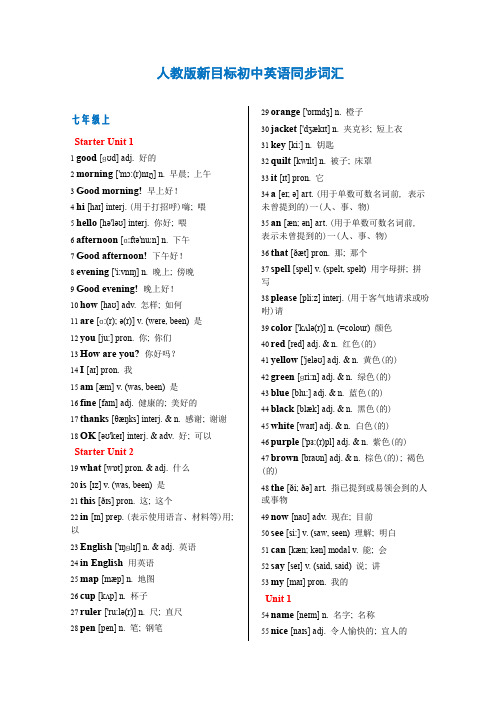
人教版新目标初中英语同步词汇七年级上Starter Unit 11 good [ɡʊd] adj. 好的2 morning ['mɔ:(r)nɪŋ] n. 早晨; 上午3 Good morning! 早上好!4 hi [haɪ] interj. (用于打招呼)嗨; 喂5 hello [hə'ləʊ] interj. 你好; 喂6 afternoon [ɑːftə'nuːn]n. 下午7 Good afternoon! 下午好!8 evening ['i:vnɪŋ]n. 晚上; 傍晚9 Good evening! 晚上好!10 how [haʊ] adv. 怎样; 如何11 are [ɑ:(r); ə(r)] v. (were, been) 是12 you [ju:] pron. 你; 你们13 How are you? 你好吗?14 I [aɪ] pron. 我15 am [æm] v. (was, been) 是16 fine [faɪn] adj. 健康的; 美好的17 thanks [θæŋks]interj. & n. 感谢; 谢谢18 OK [əʊ'keɪ] interj. & adv. 好; 可以Starter Unit 219 what [wɒt] pron. & adj. 什么20 is [ɪz] v. (was, been) 是21 this [ðɪs] pron. 这; 这个22 in [ɪn] prep. (表示使用语言、材料等)用; 以23 English ['ɪŋɡlɪʃ] n. &adj. 英语24 in English 用英语25 map [mæp] n. 地图26 cup [kʌp] n. 杯子27 ruler ['ru:lə(r)] n. 尺; 直尺28 pen [pen] n. 笔; 钢笔29 orange ['ɒrɪndʒ] n. 橙子30 jacket ['dʒækɪt] n. 夹克衫; 短上衣31 key [ki:] n. 钥匙32 quilt [kwɪlt] n. 被子; 床罩33 it [ɪt] pron. 它34 a [eɪ; ə] art. (用于单数可数名词前, 表示未曾提到的)一(人、事、物)35 an [æn; ən] art. (用于单数可数名词前, 表示未曾提到的)一(人、事、物)36 that [ðæt] pron. 那; 那个37 spell [spel] v. (spelt, spelt) 用字母拼; 拼写38 please [pli:z] interj. (用于客气地请求或吩咐)请39 color ['kʌlə(r)] n. (=colour) 颜色40 red [red] adj. & n. 红色(的)41 yellow ['jeləʊ] adj. & n. 黄色(的)42 green [ɡri:n] adj. & n. 绿色(的)43 blue [blu:] adj. & n. 蓝色(的)44 black [blæk] adj. & n. 黑色(的)45 white [waɪt] adj. & n. 白色(的)46 purple ['pз:(r)pl]adj. & n. 紫色(的)47 brown [braʊn] adj. & n. 棕色(的); 褐色(的)48 the [ði; ðə] art. 指已提到或易领会到的人或事物49 now [naʊ] adv. 现在; 目前50 see [si:] v. (saw, seen) 理解; 明白51 can [kæn; kən] modal v. 能; 会52 say [seɪ] v. (said, said) 说; 讲53 my [maɪ] pron. 我的Unit 154 name [neɪm] n. 名字; 名称55 nice [naɪs] adj. 令人愉快的; 宜人的56 to [tu:]常用于原形动词之前,表示该动词为不定式57 meet [mi:t] v. (met, met) 遇见; 相逢58 too [tu:] adv. 也; 又; 太59 your [jɔ:(r)] pron. 你的; 你们的60 Ms. [mɪz] (用于女子的姓氏或姓名前,不指明婚否)女士61 his [hɪz] pron. 他的62 and [ænd] conj. 和; 又; 而63 her [hз:(r)]pron. 她的64 yes [jes] interj. 是的; 可以65 she [ʃi:] pron. 她66 he [hi:] pron. 他67 no [nəʊ] interj. 不; 没有; 不是68 not [nɒt] adv. 不; 没有69 zero ['zɪərəʊ] num. 零70 one [wʌn] num. 一71 two [tu:] num. 二72 three [θri:]num. 三73 four [fɔ:(r)] num. 四74 five [faɪv] num. 五75 six [sɪks] num. 六76 seven ['sevn] num. 七77 eight [eɪt] num. 八78 nine [naɪn] num. 九79 telephone ['telɪfəʊn] n. 电话; 电话机80 number ['nʌmbə(r)] n. 号码; 数字81 phone [fəʊn] n. 电话; 电话机82 telephone (=phone number) 电话号码83 first [fз:(r)st]adj. 第一84 first name 名字85 last [lɑ:st] adj. 最后的; 末尾的86 last name 姓87 friend [frend] n. 朋友88 China ['tʃaɪnə] n. 中国89 middle ['mɪdl] adj. &n. 中间的;中间90 school [sku:l] n. 学校91 middle school 中学; 初中Unit 292 sister ['sɪstə(r)] n. 姐; 妹93 mother ['mʌðə(r)] n. 母亲; 妈妈94 father ['fɑ:ðə(r)] n. 父亲; 爸爸95 parent ['peərənt] n. 父(母)亲96 brother ['brʌðə(r)] n. 兄; 弟97 grandmother ['ɡrænmʌðə(r)] n. (外)祖母; 奶奶; 外婆; 姥姥98 grandfather ['ɡrænfɑ:ðə(r)] n. (外)祖父; 爷爷; 外公; 姥爷99 grandparent ['ɡrænpeərənt] n. 祖父(母); 外祖父(母)100 family ['fæməli] n. 家; 家庭101 those [ðəʊz] pron. 那些102 who [hu:] pron. 谁; 什么人103 oh [əʊ] interj. 哦; 啊104 these [ði:z] pron. 这些105 they [ðeɪ] pron. 他(她、它)们106 well [wel] interj. 嗯; 好吧107 have [hæv] v. 经受; 经历108 day [deɪ] n. 一天; 一日; 白天109 Have a good day! (表示祝愿)过得愉快!110 bye [baɪ] interj. (=goodbye) 再见111 son [sʌn] n. 儿子112 cousin ['kʌzn] n. 堂兄(弟、姊、妹); 表兄(弟、姊、妹)113 grandpa ['ɡrænpɑ:] n. (外)祖父; 爷爷; 外公; 姥爷114 mom [mɒm] n. (=mum) 妈妈115 aunt [ɑ:nt] n. 姑母; 姨母; 伯母; 婶母; 舅母116 grandma ['ɡrænmɑ:] n. (外)祖母; 奶奶; 外婆; 姥姥117 dad [dæd] n. 爸爸。
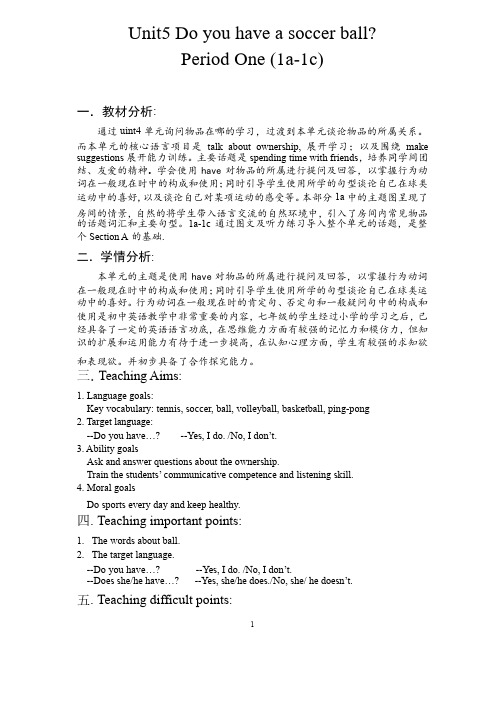
1 Unit5 Do you have a soccer ball?Period One (1a-1c)一.教材分析:通过uint4单元询问物品在哪的学习,过渡到本单元谈论物品的所属关系。
而本单元的核心语言项目是talk about ownership, 展开学习;以及围绕make suggestions 展开能力训练。
展开能力训练。
主要话题是主要话题是spending time with friends ,培养同学间团结、友爱的精神。
学会使用have 对物品的所属进行提问及回答,以掌握行为动词在一般现在时中的构成和使用;同时引导学生使用所学的句型谈论自己在球类运动中的喜好运动中的喜好,,以及谈论自己对某项运动的感受等。
本部分1a 中的主题图呈现了房间的情景,自然的将学生带入语言交流的自然环境中,引入了房间内常见物品的话题词汇和主要句型。
1a-1c 通过图文及听力练习导入整个单元的话题,是整个Section A 的基础.二.学情分析:本单元的主题是使用have 对物品的所属进行提问及回答,以掌握行为动词在一般现在时中的构成和使用;同时引导学生使用所学的句型谈论自己在球类运动中的喜好。
行为动词在一般现在时的肯定句、否定句和一般疑问句中的构成和使用是初中英语教学中非常重要的内容,七年级的学生经过小学的学习之后,已经具备了一定的英语语言功底,在思维能力方面有较强的记忆力和模仿力,但知识的扩展和运用能力有待于进一步提高,在认知心理方面,学生有较强的求知欲和表现欲。
并初步具备了合作探究能力。
三. Teaching Aims:1. Language goals:Key vocabulary: tennis, soccer, ball, volleyball, basketball, ping-pong2. Target language:----Do you have…? Do you have…?----Yes, I do. /No, I don’t.Yes, I do. /No, I don’t. 3. Ability goalsAsk and answer questions about the ownership.Train the students’ communicative competence and listening skill.4. Moral goalsDo sports every day and keep healthy.四.Teaching important points: 1. The words about ball.2. The target language.----Do you have…? Do you have…? ----Yes, I do. /No, I don’t.Yes, I do. /No, I don’t. ----Does she/he have…? Does she/he have…?----Yes, she/he does./No, she/ he doesn’t.Yes, she/he does./No, she/ he doesn’t. 五.Teaching difficult points:1. Have 与has 的使用的使用2. Do 与does 开头的一般疑问句开头的一般疑问句六.教法与学法:看图认读读单词法,模仿跟读、情境交际,合作交流等方法让学生掌握一些生活学习用品。
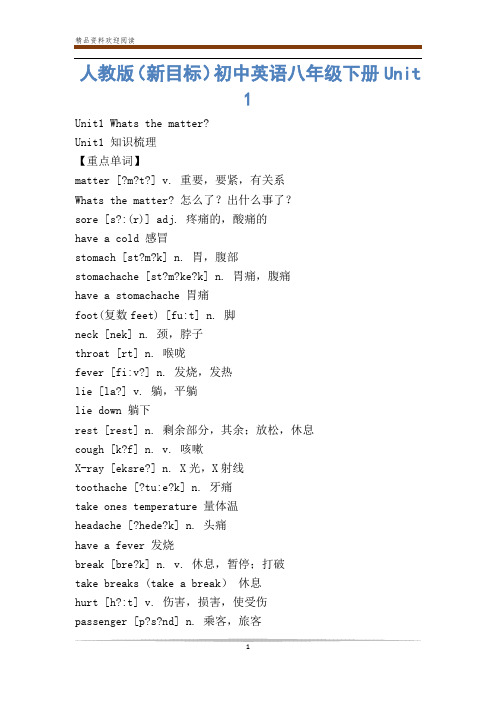
人教版(新目标)初中英语八年级下册Unit1Unit1 Whats the matter?Unit1 知识梳理【重点单词】matter [?m?t?] v. 重要,要紧,有关系Whats the matter? 怎么了?出什么事了?sore [s?:(r)] adj. 疼痛的,酸痛的have a cold 感冒stomach [st?m?k] n. 胃,腹部stomachache [st?m?ke?k] n. 胃痛,腹痛have a stomachache 胃痛foot(复数feet) [fu:t] n. 脚neck [nek] n. 颈,脖子throat [rt] n. 喉咙fever [fi:v?] n. 发烧,发热lie [la?] v. 躺,平躺lie down 躺下rest [rest] n. 剩余部分,其余;放松,休息cough [k?f] n. v. 咳嗽X-ray [eksre?] n. X光,X射线toothache [?tu:e?k] n. 牙痛take ones temperature 量体温headache [?hede?k] n. 头痛have a fever 发烧break [bre?k] n. v. 休息,暂停;打破take breaks (take a break)休息hurt [h?:t] v. 伤害,损害,使受伤passenger [p?s?nd] n. 乘客,旅客off [?f] adv. prep. 离开(某处);从去掉get off 下车to ones surprise 使惊讶,出乎意料onto [nt?] prep. 向,朝trouble [?tr?bl] n. 麻烦,烦扰,问题hit [hit] n. v. 碰撞,打,打击right away 立即,马上get into 陷入,参与herself [h?:?self] pron. 她自己,她本身(she的反身代词)bandage [b?nd?d?] n. v. 绷带;用绷带包扎sick [s?k] adj. 患病的,不适的knee [ni:] n. 膝盖nosebleed [?nzbli:d] n. 鼻出血breathe [bri:e] v. 呼吸sunburned [?s?nb?:nd] adj. 晒伤的ourselves [ɑ:?selvz] pron. 我们自己(we的反身代词)climber [?kla?m?(r)] n. 登山者be used to 习惯于适应于risk [r?sk] n. v. 风险,危险;冒险take risks (take a risk) 冒险accident [ksid?nt] n. 意外事件;事故situation [?sitju?ein] n. 状况,形式,情况kg=kilogram [?k?l?gr?m] n. 公斤,千克rock [r?k] n. 岩石run out (of) 用尽,耗尽knife [naif] n. 刀,餐刀cut off 切除blood [bl?d] n. 血mean [mi:n] v. 意味着,意思是,意欲get out of 离开,从出来importance [?m?p?:tns] n. 重要性decision [d?sn] n. 决心,决定,抉择control [k?ntrl] v. 控制,支配,操纵be in control of 掌管,管理spirit [sp?r?t] n. 勇气,意志death [de] n. 死亡give up 放弃nurse [n?:s] n. 护士【重点短语】1.have a fever 发烧2.have a cough 咳嗽3.have a toothache 牙疼4.talk too much 说得太多5.drink enough water 喝足够的水6.have a cold 受凉;感冒7.have a stomachache 胃疼8.have a sore back 背疼9.have a sore throat 喉咙痛10. take risks 冒险11.hot tea with honey 加蜂蜜的热茶12.see a dentist 看牙医13.get an X-ray 拍X 光片14.take one s temperature 量体温15.put some medicine on sth. 在上面敷药16. give up 放弃17. sound like 听起来像18. all weekend 整个周末19. in the same way 以同样的方式20. go to a doctor 看医生21. go along 沿着走22. on the side of the road 在马路边23. shout for help 大声呼救24. without thinking twice 没有多想25. get off 下车26. have a heart problem 有心脏病27. to one s surprise 另某人惊讶的是28. thanks to 多亏了;由于29. in time 及时30. make a decision 做出决定31. get into trouble 造成麻烦32. right away 立刻;马上33. because of 由于34. get out of 离开;从出来35. keep on doing sth. 继续或坚持做某事36. put a bandage on sth. 用绷带包扎37. fall down 摔倒38. feel sick 感到恶心39. have a nosebleed 流鼻血40. cut his knee 割伤他的膝盖41. put her head back 把她的头向后仰42. have problems breathing 呼吸困难43. mountain climbing 登山运动44. be used to doing sth. 习惯做某事45. run out (of) 用完;用尽46. so that 以便47. so...that... 如此以至于...48. be in control of 掌管;管理49. in a difficult situation 在闲境中【重点句型】1. Whats the matter with you?= Whatthe trouble with you?= Whats wrong with you? 你怎么了?2. What should she do? 她该怎么办呢?3.Should I take my temperature? 我应该量一下体温吗?4.You should lie down and rest. 你应该躺下休息一会儿。
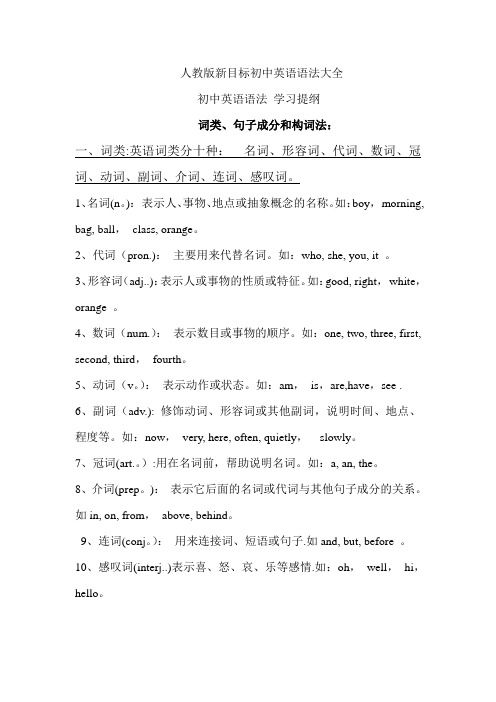
人教版新目标初中英语语法大全初中英语语法学习提纲词类、句子成分和构词法:一、词类:英语词类分十种:名词、形容词、代词、数词、冠词、动词、副词、介词、连词、感叹词。
1、名词(n。
):表示人、事物、地点或抽象概念的名称。
如:boy,morning, bag, ball,class, orange。
2、代词(pron.):主要用来代替名词。
如:who, she, you, it 。
3、形容词(adj..):表示人或事物的性质或特征。
如:good, right,white,orange 。
4、数词(num.):表示数目或事物的顺序。
如:one, two, three, first, second, third,fourth。
5、动词(v。
):表示动作或状态。
如:am,is,are,have,see .6、副词(adv.): 修饰动词、形容词或其他副词,说明时间、地点、程度等。
如:now,very, here, often, quietly,slowly。
7、冠词(art.。
):用在名词前,帮助说明名词。
如:a, an, the。
8、介词(prep。
):表示它后面的名词或代词与其他句子成分的关系。
如in, on, from,above, behind。
9、连词(conj。
):用来连接词、短语或句子.如and, but, before 。
10、感叹词(interj..)表示喜、怒、哀、乐等感情.如:oh,well,hi,hello。
二、句子成分:英语句子成分分为七种:主语、谓语、宾语、定语、状语、表语、宾语补足语。
1、主语是句子所要说的人或事物,回答是“谁”或者“什么”。
通常用名词或代词担任.如:I’m Miss Green。
(我是格林小姐)2、谓语动词说明主语的动作或状态,回答“做(什么)”。
主要由动词担任。
如:Jack clean s the room every day。
(杰克每天打扫房间)3、表语在系动词之后,说明主语的身份或特征,回答是“什么”或者“怎么样”。
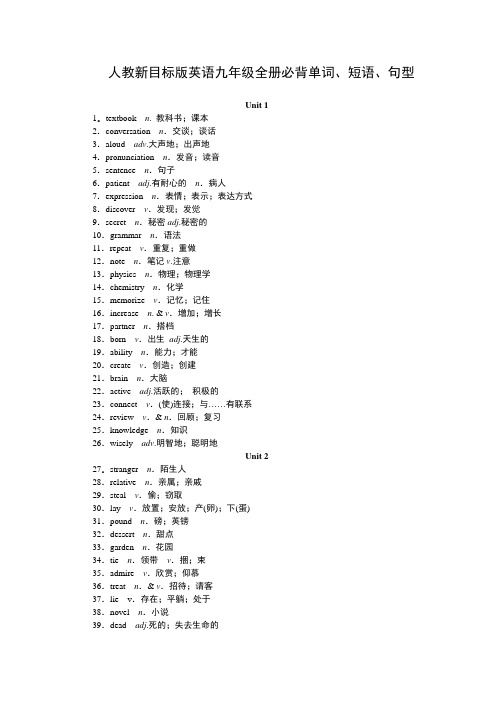
人教新目标版英语九年级全册必背单词、短语、句型Unit 11.textbook n. 教科书;课本2.conversation n.交谈;谈话3.aloud adv.大声地;出声地4.pronunciation n.发音;读音5.sentence n.句子6.patient adj.有耐心的n.病人7.expression n.表情;表示;表达方式8.discover v.发现;发觉9.secret n.秘密adj.秘密的10.grammar n.语法11.repeat v.重复;重做12.note n.笔记v.注意13.physics n.物理;物理学14.chemistry n.化学15.memorize v.记忆;记住16.increase n. & v.增加;增长17.partner n.搭档18.born v.出生adj.天生的19.ability n.能力;才能20.create v.创造;创建21.brain n.大脑22.active adj.活跃的;积极的23.connect v.(使)连接;与……有联系24.review v.& n.回顾;复习25.knowledge n.知识26.wisely adv.明智地;聪明地Unit 227.stranger n.陌生人28.relative n.亲属;亲戚29.steal v.偷;窃取30.lay v.放置;安放;产(卵);下(蛋)31.pound n.磅;英镑32.dessert n.甜点33.garden n.花园34.tie n.领带v.捆;束35.admire v.欣赏;仰慕36.treat n.& v.招待;请客37.lie v.存在;平躺;处于38.novel n.小说39.dead adj.死的;失去生命的40.business n.生意;商业41.punish v.处罚;惩罚42.warn v.警告;告诫43.present n.现在;礼物adj.现在的44.warmth n.温暖;暖和45.spread v.传播;展开n.蔓延;传播重点短语1.pay attention to注意;关注2.connect ... with把……和……联系起来3.take notes做笔记4.have a conversation谈话5.be born with天生具有6.put on (weight)增加(体重)7.lay out展开;布置8.be similar to与……相似9.end up最终成为;最后处于10.trick or treat不招待就使坏11.Christmas Eve圣诞节前夕12.dress up盛装打扮13.not only... but also...不仅……还……14.read aloud大声读必背句型1.What about listening to tapes?听磁带怎么样?2.It's too hard to understand spoken English.理解英语口语太难了。

新目标七年级下英语单词Moring 早晨afternoon下午evening晚上clock时钟nice好的;令人愉快的meet遇见;相逢question问题;难题answer答复;回答first第一last最后的;上一个的three三Seven七eight八nine九telephone电话number数字;数phone电话;电话机card卡;纸牌family家庭pencil铅笔eraser橡皮;铅笔擦ruler尺;直尺case箱;盒backpack双肩背包dictionary字典;词典spell拼写baseball棒球watch手表computer电脑;电子计算机key钥匙notebook笔记本ring环(状物);戒指call打电话lost丢失的;遗失的Found找回的please请school学校sister姐妹mother妈father爸爸Parent父亲或母亲brother兄弟grandmother祖母;外祖母grandfather祖父;外祖父Friend朋友grandparent祖父/母;外祖父/母these这些son儿子cousin堂(表)兄弟;姐妹daughter女儿uncke叔叔;伯;舅舅aunt姨母;姑母dear亲爱的photo照片here这里where在哪里table桌子bed床dresser梳妆台;碗柜bookcase书橱;书箱sofa沙发chair椅子drawer抽屉plant植物under在….之下on在..之上know知道;了解bag书包math数学alarm闹铃;警报video录像的tape录音带Hat帽子take拿走;带到thing东西;物bring拿来;取来some一些;若干need需要floor地板;地面room房间desk书桌;课桌picture图画Soccer英式足球ball球have有;吃;饮tennis网球racket球拍bat球板;棒球volleyball排球basketball篮球does做;干;行动let允许;让play玩;打球well好;令人满意Sound听起来sport运动many大量的club俱乐部more更多的,更大的class班级interesting有趣的boring无聊的fun有趣的difficult困难的relaxing轻松的watch观看great美妙的;大的collection收藏品;收藏物has(have)的第三人称单数形式but但是play sports参加体育运动或比赛only只;仅仅them(they)的宾格every day每天like喜欢banana香蕉hamburger汉堡包tomato西红柿broccoli花椰菜French fries炸马铃薯条;薯条orange橙子ice冰salad沙拉cream奶油;乳脂ice cream冰淇淋strawberry草莓pear梨have吃countable noun可数名词uncountable noun不可数名词food食物egg鸡蛋apple苹果carrot胡萝卜Breakfast早餐lunch午餐dinner晚餐fruit水果vegertable蔬菜runner奔跑者eat吃star明星lots of大量healthy健康的;强健的dessert甜食list清单furniture家具people人;人民blank空白conversation交谈;谈话other另外的also也;并且how much多少钱pants裤子sock袜子T-shirt衬衫shorts短裤shoe鞋sweater毛衣skirt裙子dollar美元color颜色black黑色green绿色blue蓝色white白色big大small小help帮助want想要welcome不必客气eleven 11fifteen 15 eighteen 18come来buy买price价格each每个see看见sell卖from从have a look看一看on sale廉价出售Yellow黄色short短的long长的clerk职员;办事员here you are给你example例子;实例Twelve 12Twenty 20Thirty 30clothes衣服;服装store商店very很;非常anybody任何人Afford负担得起;买得起yourself你自己When什么时候;何时birthday生日month月份January一月february二月march三月april四月may五月june六月july七月august八月september九月october十月november十一月deccember12月tenth第十fifteenth第15second第二third第三fifth第五date日期happy愉快的;高兴的happy birthday生日快乐age年纪;年龄old年老的how old多大年纪speech演说;讲演contest竞争;比赛party聚会;晚会trip旅途;观光团art艺术;美术festival节;节日Chinese中国人music音乐year年movie电影go to a movie去看电影action动作片comedy喜剧documentary纪录片thriller恐怖电影或小说Kind种类opera歌剧biejingopera京剧find寻找someone某人who谁student学生scary可怕funny有趣的sad悲伤的exciting令人激动的really真正的often时常think认为learn学习about关于history历史with附有favorite最喜爱的 actor演员new新的successful成功的 weekend周末too太guitar吉他join加入dance跳舞swim游泳sing唱歌chess国际象棋paint画画speak说话kid小孩our我们的drum鼓piano钢琴trumpet喇叭violin小提琴or或者musician音乐家then那时be是rock摇滚乐band乐队show演出Sunday周日pm下午kungfu功夫may可能draw画little少许e-mail电子邮件address地址why为什么time时间go to school上学get up起床shower淋浴take a shower洗澡usually通常work工作hour小时brush刷teeth牙齿after在。
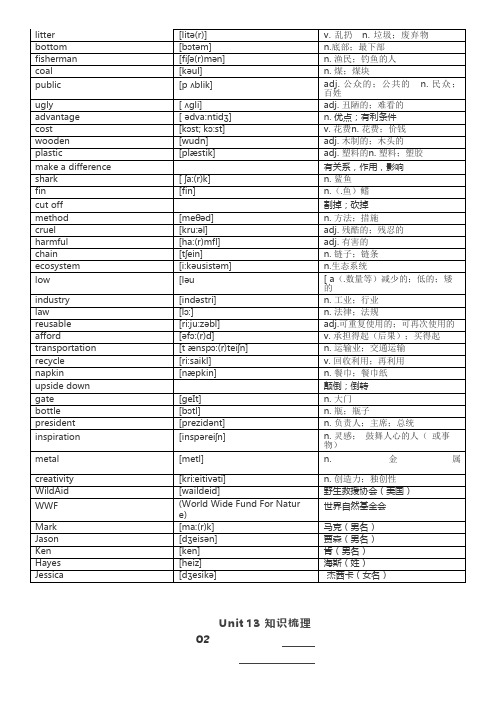
Unit 13 知识梳理02【重点短语】1.at the bottom of the river 在河床底部2.be full of the rubbish 充满了垃圾3.throw litter into the river 把垃圾扔入河中4.play a part in cleaning it up 尽一份力把它清理干净nd pollution 土地污染6.fill the air with black smoke 使空气中充满了黑烟7.cut down air pollution 减少空气污染8.make a difference 产生影响17.take action 采取行动18.turn off 关掉19.pay for 付费20.add up 累加e public transportation 使用公共交通22.recycle books and paper 回收书和废纸e paper napkins 使用纸巾24.turn off the shower 关掉喷头25.ride in cars 开车出行【重点句型】1.E ven the bottom of the river was full of rubbish.即使河底都充满垃圾。
2.E veryone in town should play a part in cleaning it up.城里的每个人都应当尽一份力把它清理干净。
3.T he air is badly polluted because there are too many cars on the road these days. 空气被严重污染因为如今路上的汽车太多了。
4.T o cut down air pollution, we should take the bus or subway instead of driving. 为了减少空气污染,我们应当乘坐公汽或地铁而不是开车。
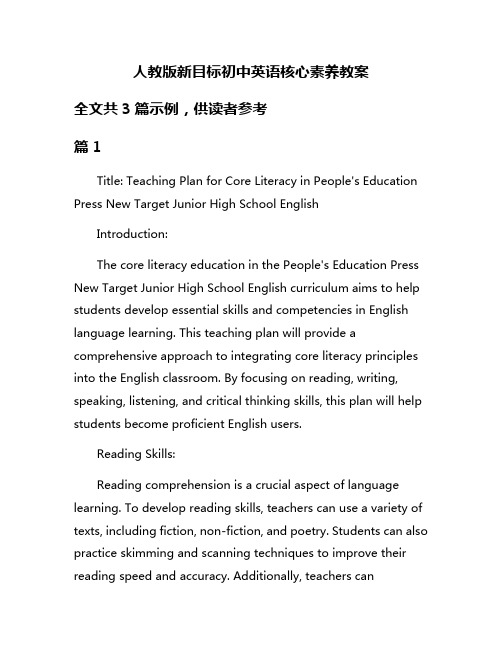
人教版新目标初中英语核心素养教案全文共3篇示例,供读者参考篇1Title: Teaching Plan for Core Literacy in People's Education Press New Target Junior High School EnglishIntroduction:The core literacy education in the People's Education Press New Target Junior High School English curriculum aims to help students develop essential skills and competencies in English language learning. This teaching plan will provide a comprehensive approach to integrating core literacy principles into the English classroom. By focusing on reading, writing, speaking, listening, and critical thinking skills, this plan will help students become proficient English users.Reading Skills:Reading comprehension is a crucial aspect of language learning. To develop reading skills, teachers can use a variety of texts, including fiction, non-fiction, and poetry. Students can also practice skimming and scanning techniques to improve their reading speed and accuracy. Additionally, teachers canincorporate reading strategies such as predicting, inferring, and summarizing to help students understand and analyze texts more effectively.Writing Skills:Writing is another essential aspect of language learning. To develop writing skills, teachers can assign different types of writing tasks, such as essays, reports, and letters. Students can practice organizing their ideas, using appropriate vocabulary and grammar, and editing their work for clarity and accuracy. Teachers can also provide feedback and guidance to help students improve their writing skills over time.Speaking Skills:Speaking skills are crucial for effective communication. To develop speaking skills, teachers can encourage students to participate in classroom discussions, debates, and presentations. Teachers can also incorporate role-playing activities, mock interviews, and group projects to help students practice speaking in a variety of contexts. Additionally, teachers can provide opportunities for students to practice pronunciation, intonation, and fluency in English.Listening Skills:Listening skills are essential for understanding spoken English. To develop listening skills, teachers can use a variety of audio materials, such as podcasts, songs, and videos. Students can practice listening for specific information, main ideas, and details. Teachers can also incorporate listening comprehension activities, such as dictation, gap-fill exercises, and note-taking to help students improve their listening skills.Critical Thinking Skills:Critical thinking skills are vital for analyzing and evaluating information. To develop critical thinking skills, teachers can encourage students to question, analyze, and evaluate texts and ideas. Students can practice comparing and contrasting different viewpoints, identifying biases and assumptions, and developing their own opinions and arguments. Teachers can also provide opportunities for students to engage in discussions, debates, and critical reflection on texts and topics.Conclusion:In conclusion, the core literacy education in the People's Education Press New Target Junior High School English curriculum is designed to help students become proficient English users. By focusing on reading, writing, speaking, listening, and critical thinking skills, this teaching plan will provide acomprehensive approach to integrating core literacy principles into the English classroom. Through a variety of activities and strategies, teachers can help students develop essential skills and competencies in English language learning.篇2Title: Teaching Core Literacy Skills with the People's Education Press New Target Junior High School English Teaching PlanIntroduction:The People's Education Press New Target Junior High School English Teaching Plan is designed to help students develop core literacy skills in English. This teaching plan focuses on key areas of language learning such as reading, writing, speaking, and listening. Through a variety of engaging activities and exercises, students can improve their English proficiency and develop a deeper understanding of the language.Reading:Reading is a fundamental skill in language learning. The New Target Junior High School English Teaching Plan includes a wide range of reading materials designed to help students build their reading comprehension skills. Teachers can use short stories,articles, and other texts to introduce new vocabulary and grammar concepts and encourage students to practice reading for meaning.Writing:Writing is another important aspect of language learning. The New Target Junior High School English Teaching Plan includes exercises that focus on writing skills such as grammar, vocabulary, and sentence structure. Students can practice writing short essays, letters, and other types of texts to improve their writing proficiency and develop their communication skills.Speaking:Speaking is crucial for developing oral communication skills in English. The New Target Junior High School English Teaching Plan includes activities that focus on speaking practice, such as role-plays, dialogues, and oral presentations. Students can practice speaking in a variety of contexts to build their confidence and fluency in English.Listening:Listening is an essential skill for understanding spoken English. The New Target Junior High School English Teaching Plan includes listening exercises that help students practicelistening for specific information, main ideas, and supporting details. These exercises can help students improve their listening comprehension and develop their ability to understand English in real-life situations.Conclusion:The People's Education Press New Target Junior High School English Teaching Plan is a comprehensive resource for teaching core literacy skills in English. By incorporating reading, writing, speaking, and listening activities into their lessons, teachers can help students develop a deeper understanding of the language and improve their English proficiency. With a focus on engaging activities and exercises, this teaching plan can help students build the skills they need to succeed in their English language learning journey.篇3Title: Teaching Plan for Core Literacy in People's Education Press New Target Junior High School EnglishIntroductionIn the new era, the education concept is undergoing changes, and the cultivation of core literacy has become an important goal of education. The New Target series published byPeople's Education Press has integrated core literacy into the teaching of English in junior high school, aiming to help students develop comprehensive abilities such as critical thinking, problem-solving, and communication skills. This teaching plan will focus on how to effectively integrate core literacy into the teaching of English in junior high school using the New Target series.Teaching Goals1. To help students improve their language proficiency in listening, speaking, reading, and writing.2. To cultivate students' critical thinking skills through analyzing and evaluating texts.3. To enhance students' problem-solving abilities by engaging them in activities that require creative thinking.4. To develop students' communication skills through interactions with classmates and teachers.5. To encourage students to become independent learners and take responsibility for their own learning.Teaching Strategies1. Use a variety of teaching methods to cater to different learning styles, such as group discussions, role-playing, and hands-on activities.2. Incorporate real-life situations into lessons to make learning more meaningful and relevant to students.3. Encourage students to ask questions and express their opinions freely to promote active participation in class.4. Provide timely feedback and guidance to help students improve their learning outcomes.5. Emphasize the importance of self-reflection andself-assessment to foster a growth mindset in students.Teaching Activities1. Reading Comprehension: Have students read a passage from the textbook and answer questions to test their understanding. Encourage them to think critically about the text and discuss with classmates.2. Group Discussion: Divide students into groups and assign them a topic to discuss. Each group will present their findings and opinions to the class, promoting communication and collaboration.3. Creative Writing: Ask students to write a short story or essay on a given topic. Encourage them to use their imagination and creativity to express their thoughts.4. Role-Playing: Assign students roles in a role-playing activity where they act out a dialogue based on a real-life scenario. This will help improve their speaking and listening skills.5. Project-based Learning: Have students work on a project that requires research, analysis, and presentation. This will help them develop problem-solving skills and teamwork.ConclusionBy integrating core literacy into the teaching of English using the New Target series, we can help students develop the necessary skills and abilities to succeed in the 21st century. Through a combination of effective teaching strategies and engaging activities, we can create a dynamic learning environment that fosters growth and development in students. Let's work together to cultivate the next generation of global citizens who are equipped with the core literacy skills they need to thrive in an ever-changing world.。

新目标教材介绍《义务教育课程标准实验教科书英语(新目标)》(以下简称《英语(新目标)》)是人民教育出版社在适应基础教育课程整体改革需要的趋势下,与(美国)汤姆森学习出版集团合作,在该集团出版的教材Go for it!基础上,依据教育部颁发的《全日制义务教育普通高级中学英语课程标准(实验稿)》(以下简称《英语课程标准》)改编的一套7~9年级英语教材。
本套教材供7~9年级的学生使用。
全套教材共5册,学期3年。
一、教材编写理念与思路任务型语言教学是继交际教学思想发展起来的一种教学途径,近几年来逐渐成为国际上广泛采用的教学方法。
它把语言应用的基本理念转化为具有实践意义的课堂教学方式,以学生为学习活动的主体,以任务为中心,在运用语言完成各种任务的过程中来学习、体会、掌握语言。
《英语(新目标)》的改编,以任务型语言教学为编写理念,以“合理引进国外语言教育理念,适应我国英语教育实际状况”为宗旨,分析和研究了我国大部分地区初中英语教育的现实情况,力图把基于生活任务的语言教学模式引入到我国的英语教学领域中来。
本套教材的基本编写思路是:以话题为主线,采用任务型语言教学模式,兼顾交际功能和语言知识结构的学习,以一种循序渐进的生活化的学习程序,引导学生学会运用英语有目的地做事情。
二、教材主要特点(一)语言与文化语言有着丰富的文化内涵,语言与文化密不可分。
学习语言不仅仅是学习语言本身,同时还要了解语言所传递的文化信息。
《英语课程标准》指出,接触和了解英语国家文化有益于对英语的理解和使用,有益于加深对本国文化的理解和认识。
本套教材在系统编排语言知识的同时,注重激活学生已有的文化背景知识,并由浅入深地介绍英语国家的文化,培养学生对中西方文化差异的敏感性,寓思想教育于语言教学之中,提高学生对文化差异的鉴别能力,使学生逐步学会在实际情景中恰当而灵活地运用语言。
这套教材语言地道,有很多原汁原味、反映西方文化的文段;在第4、5册的每单元之后设计编写了阅读专栏,所有内容均涉及东西方文化交流。
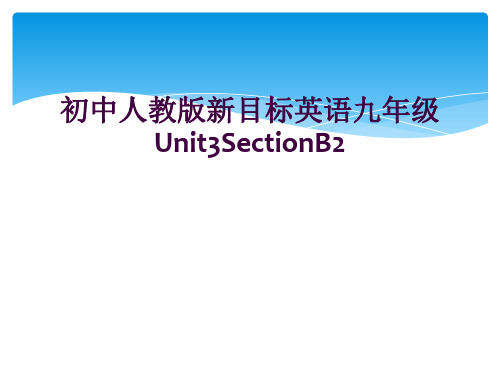
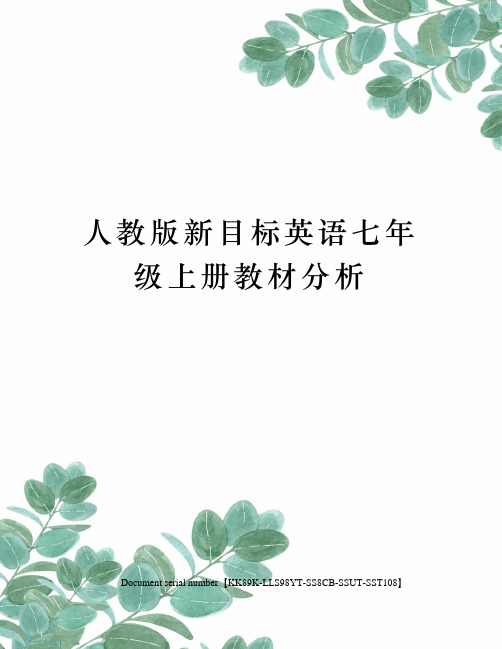
人教版新目标英语七年级上册教材分析Document serial number【KK89K-LLS98YT-SS8CB-SSUT-SST108】七年级上册由预备篇(三个单元)和正式篇(十二个单元)两部分组成。
每个单元分为ABC三部分,共有6页。
其中包括Section A、Section B和Self Check。
预备篇是为了使没有英语学习基础的学生更好地使用本套教材而编写的。
它的主要内容为26个英文字母和最基本的英语日常用语。
Starter Unit1 Good morning!教材分析本单元要求学生掌握英文字母A — H,能认读其印刷体和手写体字母的大小写等四种形式。
书写(大写和小写,笔顺,笔画)基本合乎要求。
能看,听,说本单元所列的日常交际用语,重点学会打招呼,并做到语音语调正确。
注意一些字母及日常交际用语的发音,万事开头难,首先利用这个单元培养学生们对英语的兴趣,因为兴趣是最好的老师。
Starter Unit2 What’s this in English?教材分析本单元的教学内容为:学习letters(Ii — Rr)10个字母;学习words(map, orange, jacket, key, pen, ruler, quilt)等7个表示事物的单词;本单元的核心教学内容是“认物”。
用英语确认周围的常见事物,比较符合英语初学者的实际情况。
通过本单元教学,使学生运用所学句型,去熟悉周围事物的名称;教学生学会在实际生活中如何确认事物。
通过辨认物体,学生学到一些生词,并巩固所学句型。
所以教师要尽量使学生对课文中出现的句型能够熟练上口。
这样,学生才能顺利开展比较灵活的对话。
教师可以用手势,表情,动作等示意、帮助学生听懂课堂教学内容,但在实际操作中应尽量避免“明知故问”的倾向,应该采用应用性原则;如:遮盖物品、显露局部、辨认物体、完形识别、图形辨认等方法。
目标在学生学习过程中的作用至关重要,教师要帮助他们建立起一个切合自己实际的目标,通过渐进的学习以及一点一滴的进步,使他们逐步建立起成功感。

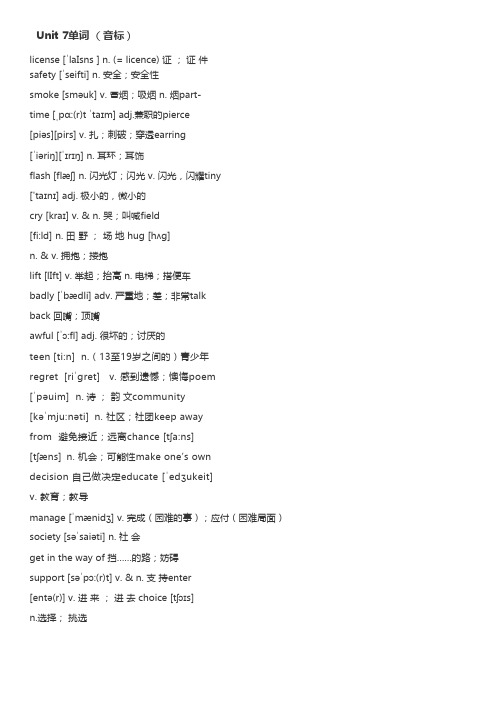
Unit 7单词(音标)license [ˈlaIsns ] n. (= licence) 证;证件safety [ˈseifti] n. 安全;安全性smoke [sməuk] v. 冒烟;吸烟 n. 烟part-time [ˌpɑ:(r)t ˈtaɪm] adj.兼职的pierce[piəs][pirs] v. 扎;刺破;穿透earring[ˈiəriŋ][ˈɪrɪŋ] n. 耳环;耳饰flash [flæʃ] n. 闪光灯;闪光 v. 闪光,闪耀tiny['taɪnɪ] adj. 极小的,微小的cry [kraɪ] v. & n. 哭;叫喊field[fi:ld] n. 田野;场地 hug [hʌg]n. & v. 拥抱;搂抱lift [lIft] v. 举起;抬高 n. 电梯;搭便车badly [ˈbædli] adv. 严重地;差;非常talkback 回嘴;顶嘴awful [ˈɔ:fl] adj. 很坏的;讨厌的teen [ti:n]n.(13至19岁之间的)青少年regret [riˈgret]v. 感到遗憾;懊悔poem[ˈpəuim] n. 诗;韵文community[kəˈmju:nəti]n. 社区;社团keep awayfrom 避免接近;远离chance [tʃa:ns][tʃæns] n. 机会;可能性make one’s owndecision 自己做决定educate [ˈedʒukeit]v. 教育;教导manage [ˈmænidʒ] v. 完成(困难的事);应付(困难局面)society [səˈsaiəti] n. 社会get in the way of 挡……的路;妨碍support [səˈpɔ:(r)t] v. & n. 支持enter[entə(r)] v. 进来;进去 choice [tʃɔɪs]n.选择;挑选Picasso [pi'kæsəu] 毕加索(西班牙画家)U n i t 7 知识梳理Unit7 Teenagers should be allowed to choose their own clothes.【重点短语】1.get his driver’s license 取得驾驶执照2.no way没门,不行3.s ixteen-year-olds 十六岁的人sixteen-year-old 十六岁的4.be worried about=worry about 担5.have part-time jobs 做兼职工作6.get one’s ears pierced 打耳洞7.get / have / make sth. done 使某物被做……8.stop doing sth 停止做某事9.stop to do sth. 停下来去做某事10.spend time with sb. 花时间和某人在一起11.take photos, take a photo 照相e a flash 使用闪光灯13.all night 整夜14.stay by my side 呆在我身边15.make sure = be sure 确保,确定16.keep sb. (away) from sth使某人远离某物17.hurt oneself 伤害某人自己18.give sb. a hug = hug sb. 拥抱某人19.lift sb.up 举起某人20.cough badly 剧烈地咳嗽21.talk back 回嘴22.an adult 一个成人23.think back to 回想起24.regret doing sth. 后悔做了某事25.make one’s own decision 做某人自己的觉得26.too + adj.+ to do sth. 太…而不能做某事27.learn…from…从…...学到…...28.agree with sb 同意某人的观点29.disagree with sb. 不同意某人的观点30.move out 搬出去【重点句型】1.I don’t think twelve-year-olds should be allowed to get their ears pierced. 我认为不应该允许12岁的孩子穿耳孔。